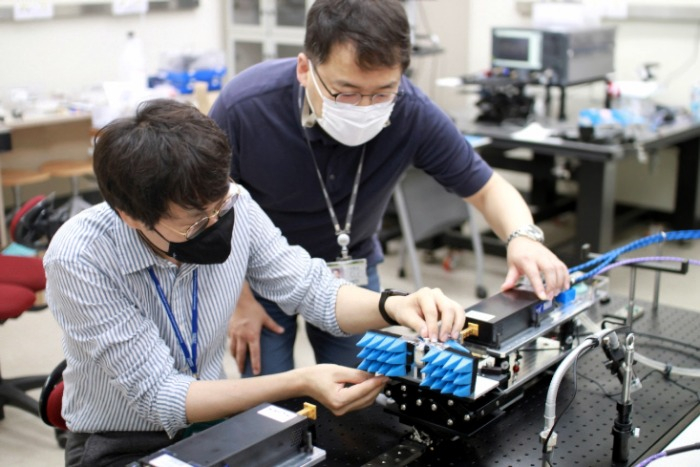LG ramps up 6G development for first mover advantage
The conglomerate expands its 6G telecom business to dominate the robotics and future of mobility ecosystems
By Feb 18, 2022 (Gmt+09:00)
Samsung steps up AR race with advanced microdisplay for smart glasses


When in S. Korea, it’s a ritual: Foreigners make stops at CU, GS25, 7-Eleven


Maybe Happy Ending: A robot love story that rewrote Broadway playbook


NPS yet to schedule external manager selection; PE firms’ fundraising woes deepen


US auto parts tariffs take effect; Korea avoids heavy hit



Industry insiders familiar with the collaboration said the agreement between LG and South Korea's state-run elite science university to continue working together over the next three years is aimed at developing 6G technology to be used in Terahertz band wireless transmission and reception, the convergence of telecommunications and sensors and the future of security.
During the first phase of the collaboration that began in 2019, LG and KAIST secured about 20 source technologies in 6G. The biggest feat was in developing the world’s first 27GHz bandwidth wideband beamforming solution.
Beamforming refers to a type of radiofrequency used to send focused signals to a targeted device. The technology allows an access point to use multiple antennas to send out the same signal to a specific receiving device.
“The first phase of the joint project was about searching for and discovering 6G technologies,” an LG Electronics employee told The Korea Economic Daily. “The second phase will focus on developing technologies for industrial adoption."
The employee added, “We plan to complete seven tasks related to securing new technologies each year.”
FOCUS ON ADOPTION
LG Electronics has been expanding its collaborations in the 6G technology development with research centers and corporations at home and abroad.
Last year, the electronics giant worked with a German research center, the Fraunhofer Society, to develop a power amplifier element to successfully transmit and receive 6G band wireless data for an outdoor straight line distance of over 100 meters.
LG is also working with The Korea Research Institute of Standards and Science (KRISS) and Keysight Technologies, a US company that manufactures equipment and develops software for electronics testing and measurement.
The company is also passionate about leading global technology standards.
Last June, the US Alliance for Telecommunications Industry Solutions (ATIS) selected LG as its chair company for the Next Generation Telecommunications Union.
Headquartered in Washington, DC, ATIS is a standards organization that develops technical and operational standards and solutions for the ICT industry with 150 member companies.
FIRST MOVER ADVANTAGE
LG is not a telecommunications company nor does it still operate the mobile phone unit. Early last year, the company announced its exit from the loss-making mobile phone business.
Also, industrial adoption of the 6G network is not forecast to begin until around 2029.
So why is LG Electronics so heavily invested in the 6G network?
The latest network is thought to serve as the basis for what the company views as its core businesses going forward – namely electronic parts for automobiles, robotics, self-driving cars and IoT-based smart devices.
Operating at terahertz frequency bands, 6G will deliver a peak data rate of 1,000 gigabits; with air latency of fewer than 100 microseconds. The 6G speed is expected to be 100 times faster than 5G with enhanced reliability and wider network coverage.
On 6G networks, fully autonomous driving, robotics-based remote surgery, real-time holograms, and urban air mobility can be realized – which are not operational on 5G networks.

Based on 6G, LG Electronics hopes to launch a variety of new businesses.
Using IoT and metaverse, the car owner can enjoy movies, camping, and shopping without having to move an inch outside of the vehicle.
The source technology development in and of itself could be a gold mine for LG. Going forward, the 6G network will likely be used in nearly all aspects of our lives from mobility to entertainment.
If LG can attain patents for its 6G technologies, it can generate revenue through fees from each company or organization that uses the technology.
Write to Han-Gyeol Seon at always@hankyung.com
Jee Abbey Lee edited this article.
-
 Mobile networksSamsung, LG take major steps forward in 6G commercialization
Mobile networksSamsung, LG take major steps forward in 6G commercializationJun 17, 2021 (Gmt+09:00)
4 Min read -
 Business restructuringLG Elec to fold mobile phone business in 26 yrs
Business restructuringLG Elec to fold mobile phone business in 26 yrsApr 05, 2021 (Gmt+09:00)
2 Min read


